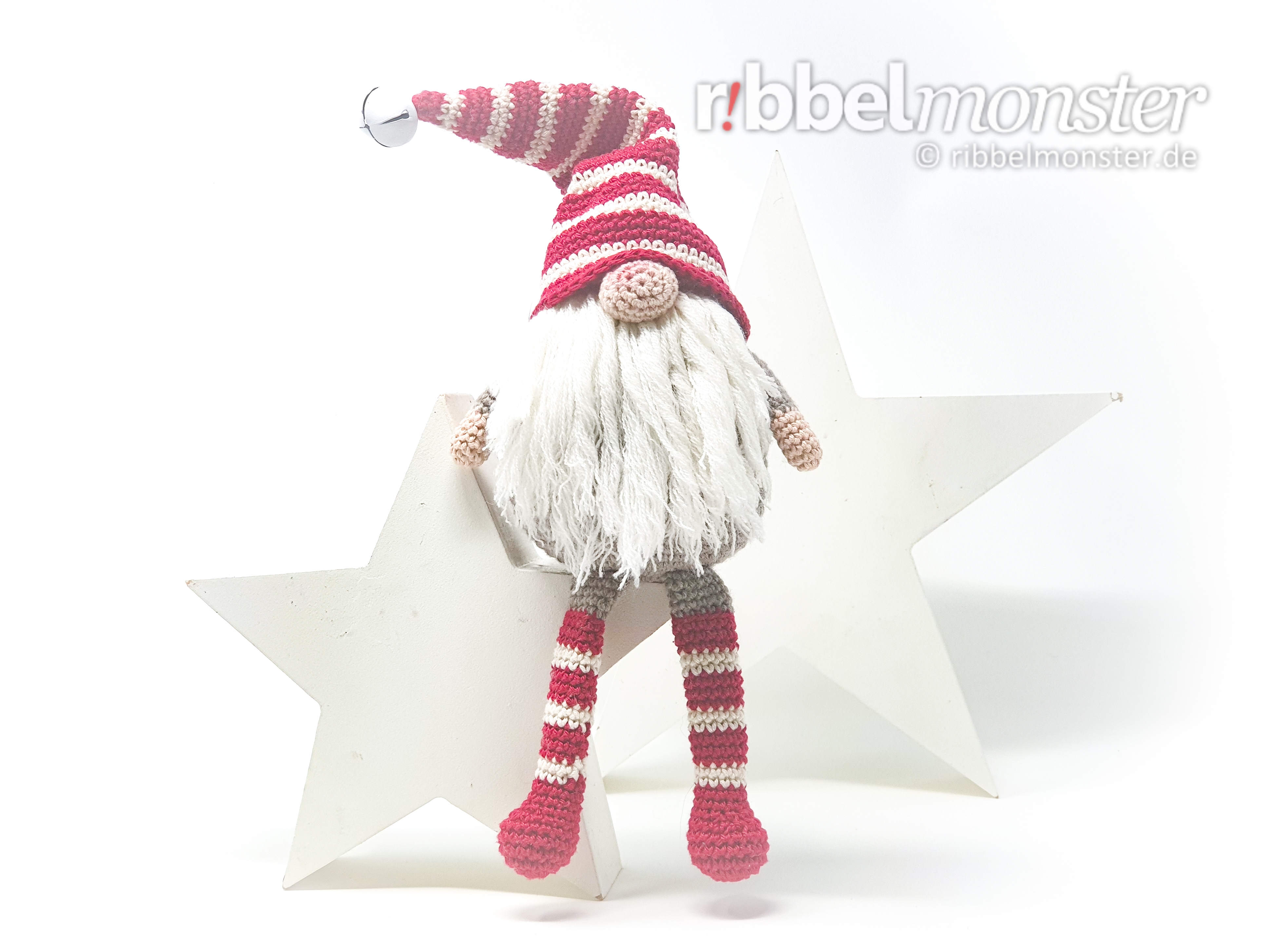With this crochet pattern, you can create “Terentius,” the Amigurumi Crochet Christmas Gnome. Terentius is a cute bearded fellow with long legs who prefers to wear his hat low on his bulbous nose. What could be under his hat? The crocheted Christmas gnome is a great decoration and also a cute stuffed toy for children.
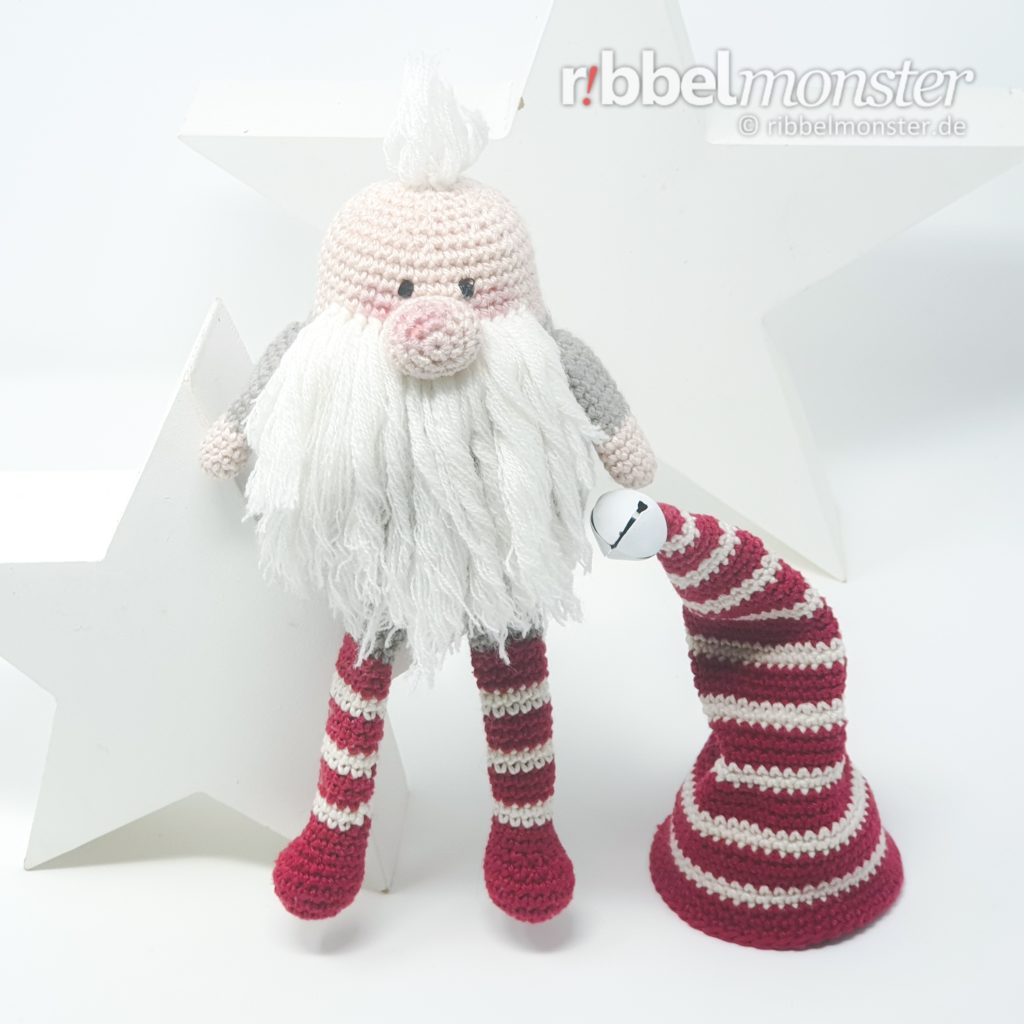
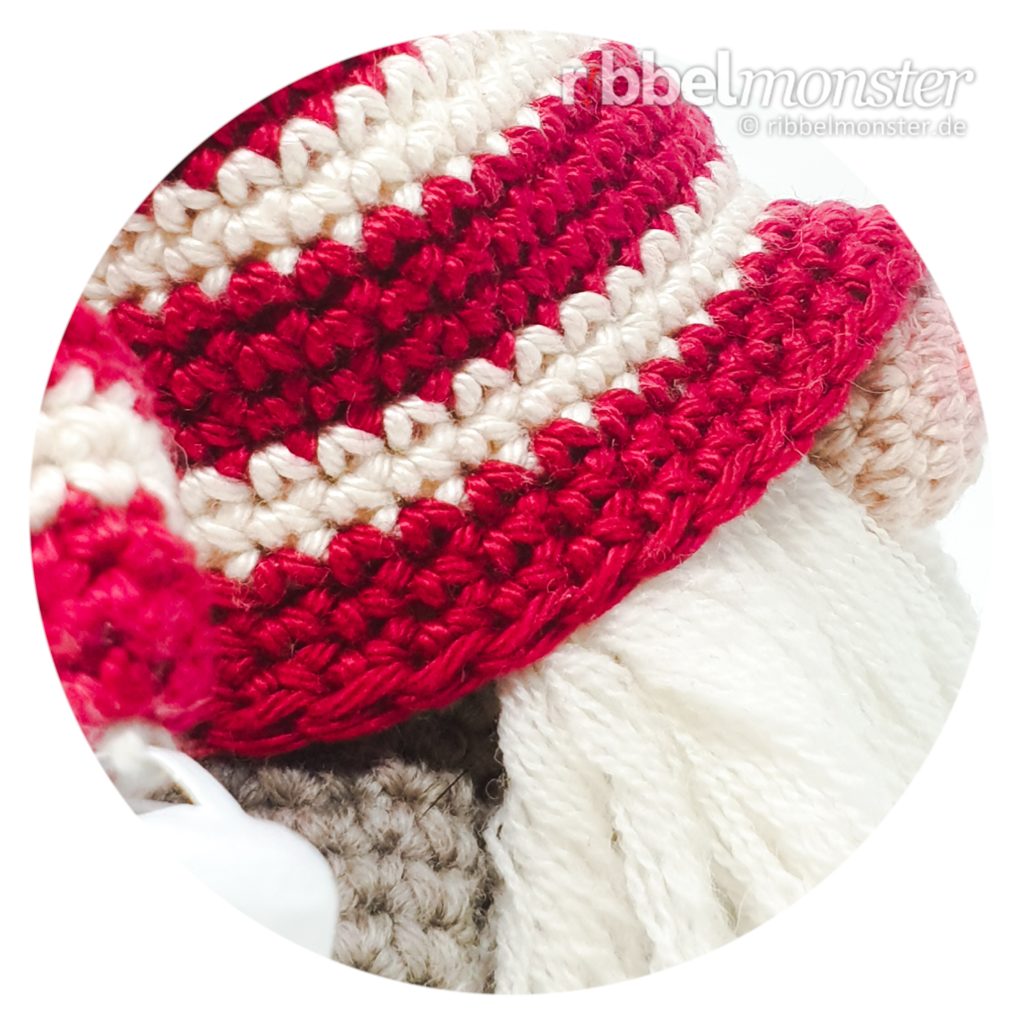
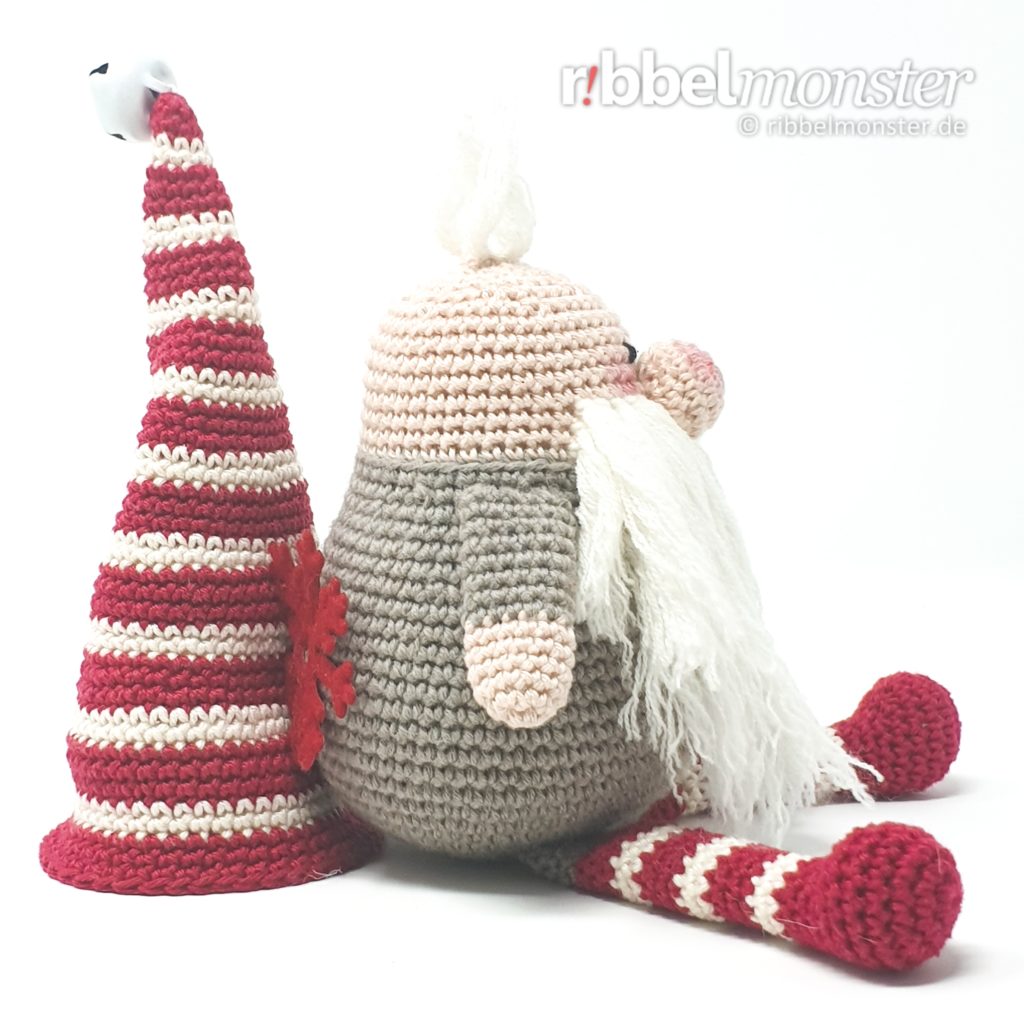
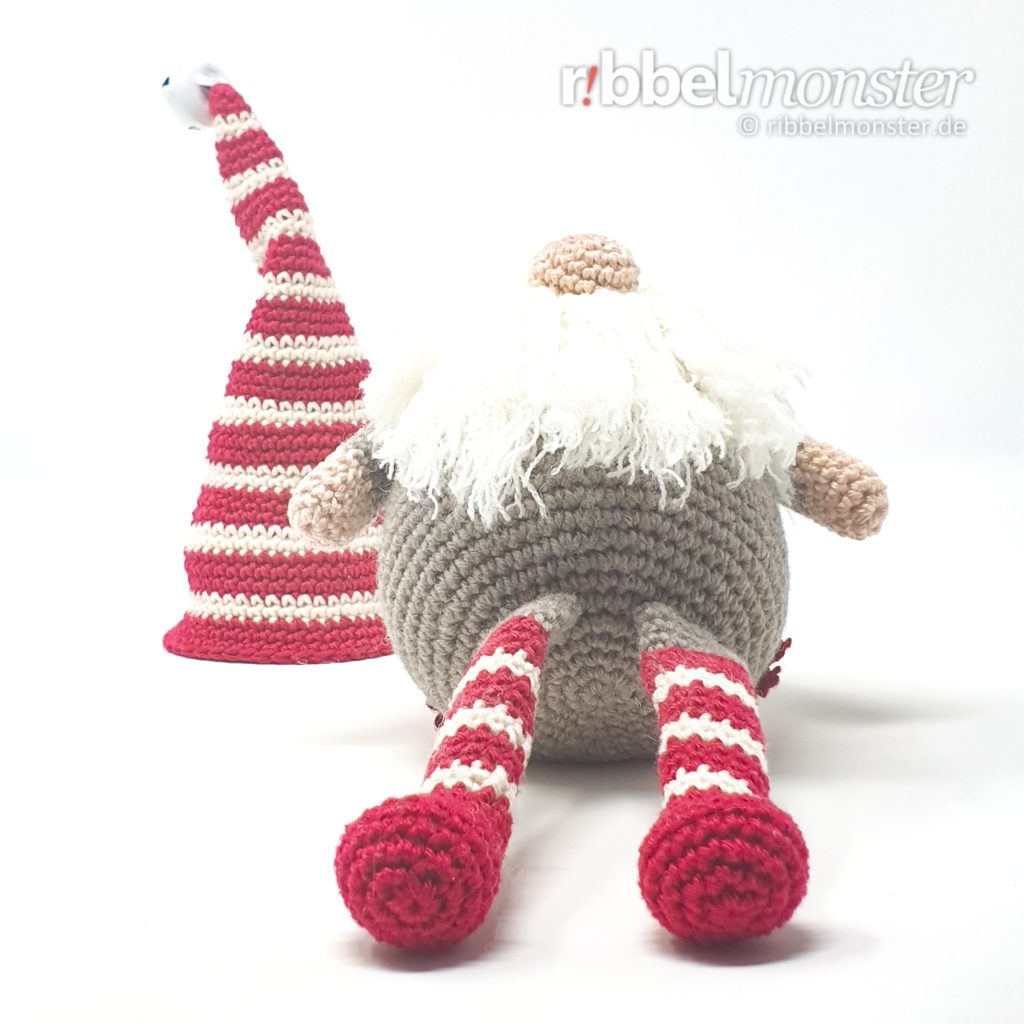
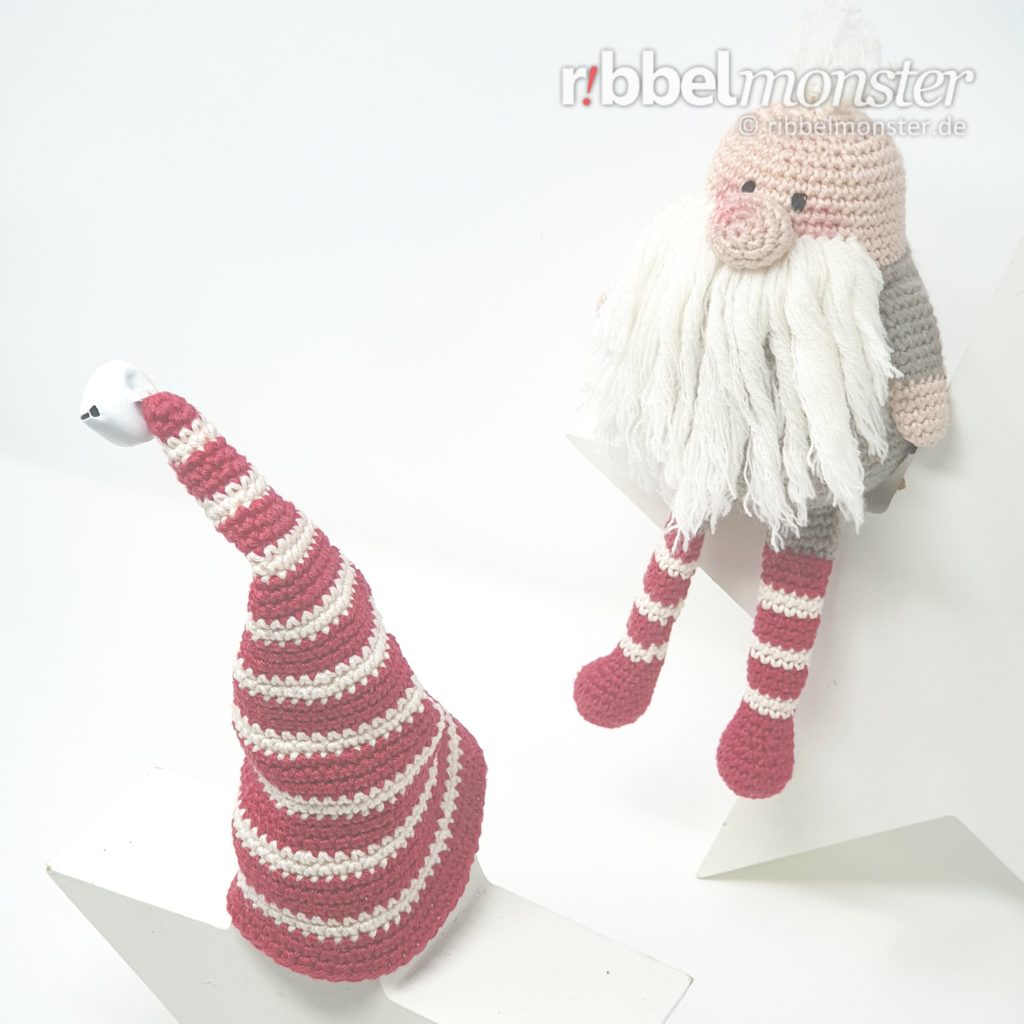
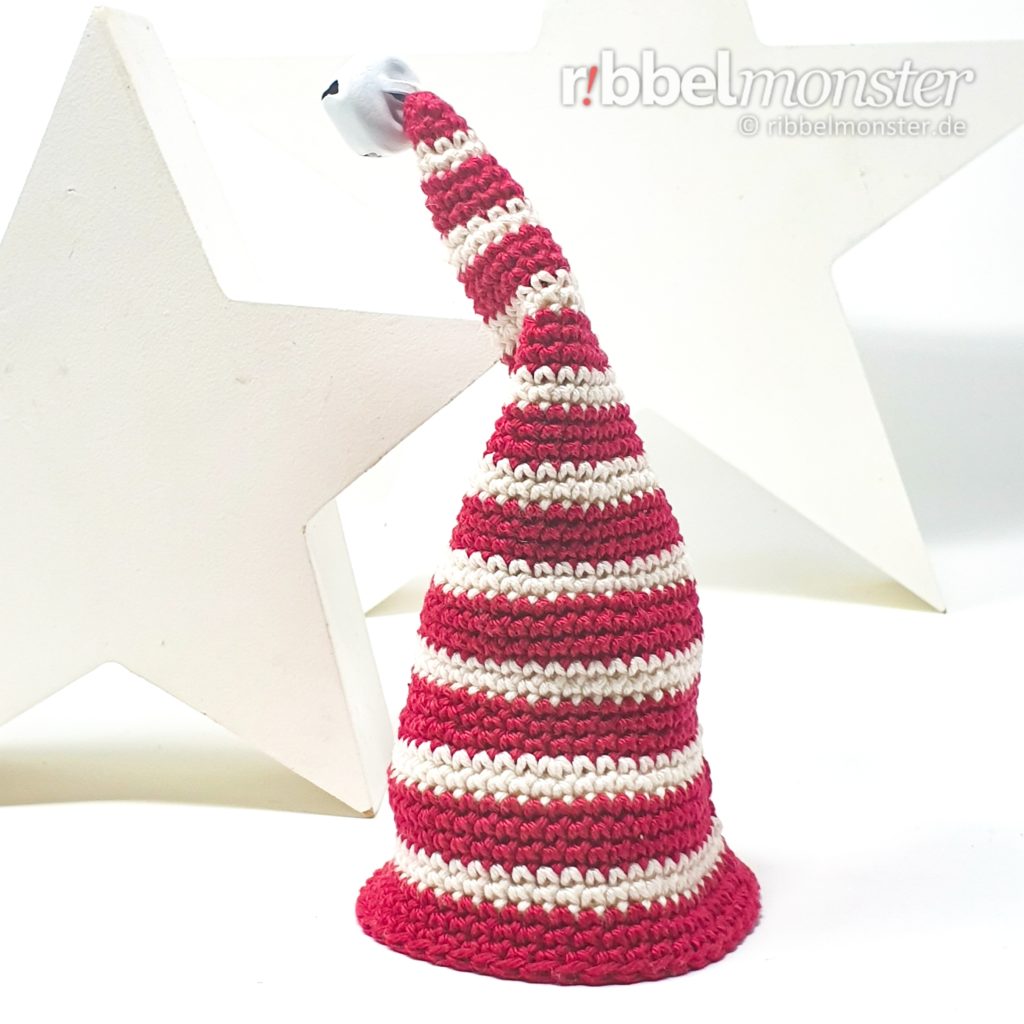
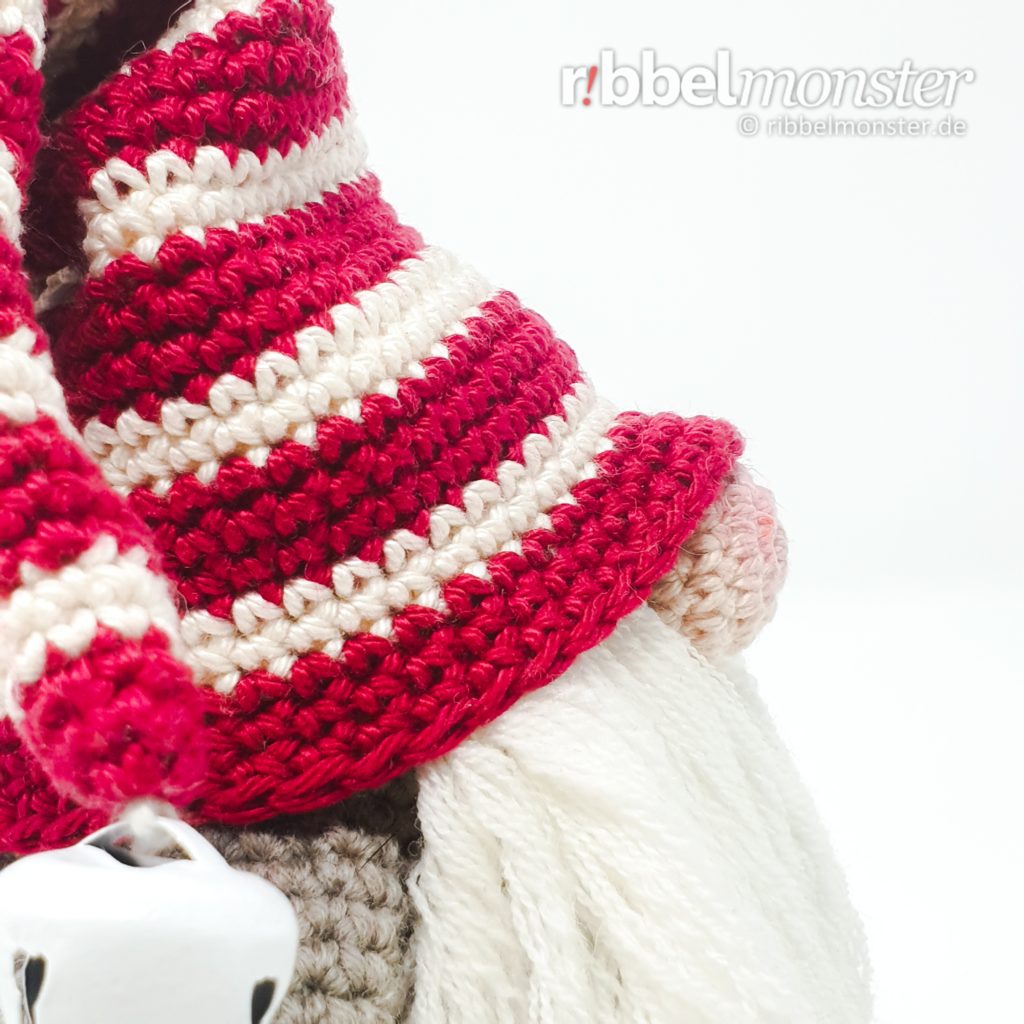
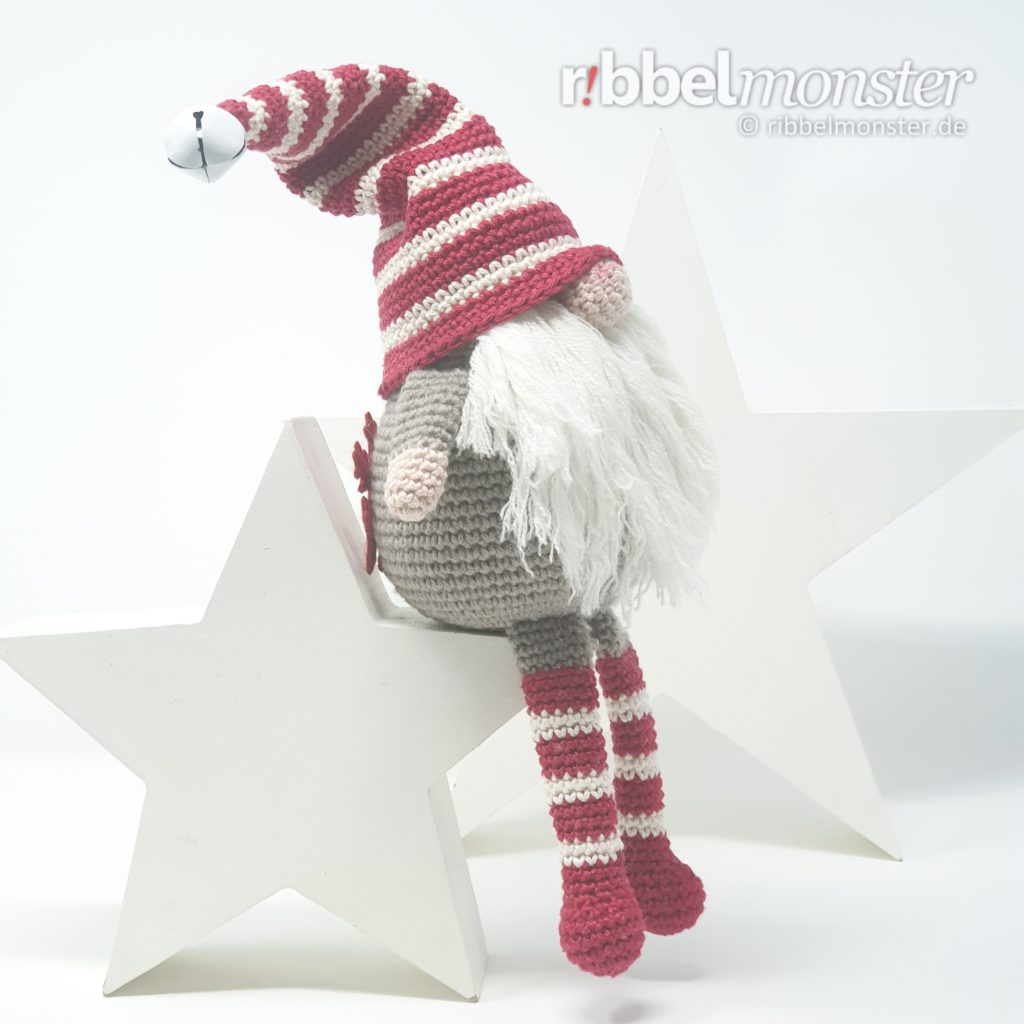
Content
Introduction: Amigurumi – Crochet Christmas Gnome “Terentius Tenuis”
To successfully crochet the Amigurumi Christmas Gnome, some preparation is essential. In this section, all relevant information about the required prerequisites, materials, and size is listed. If you need help, you will find additional links in the respective sections.
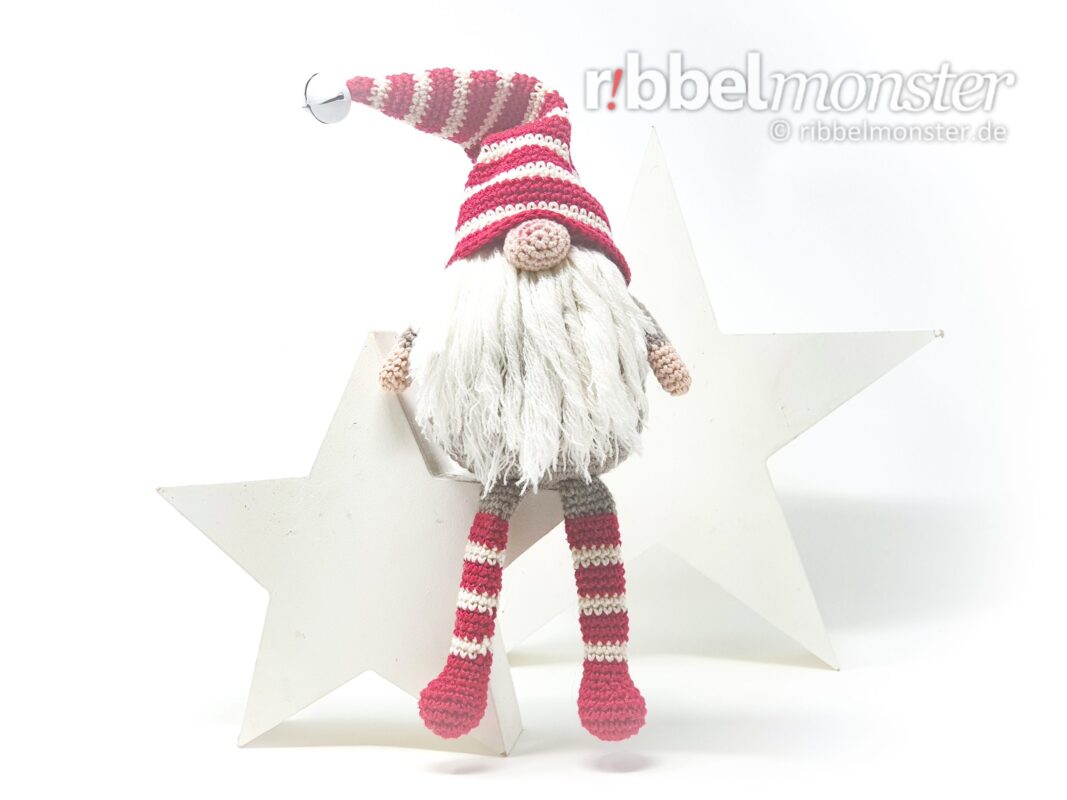
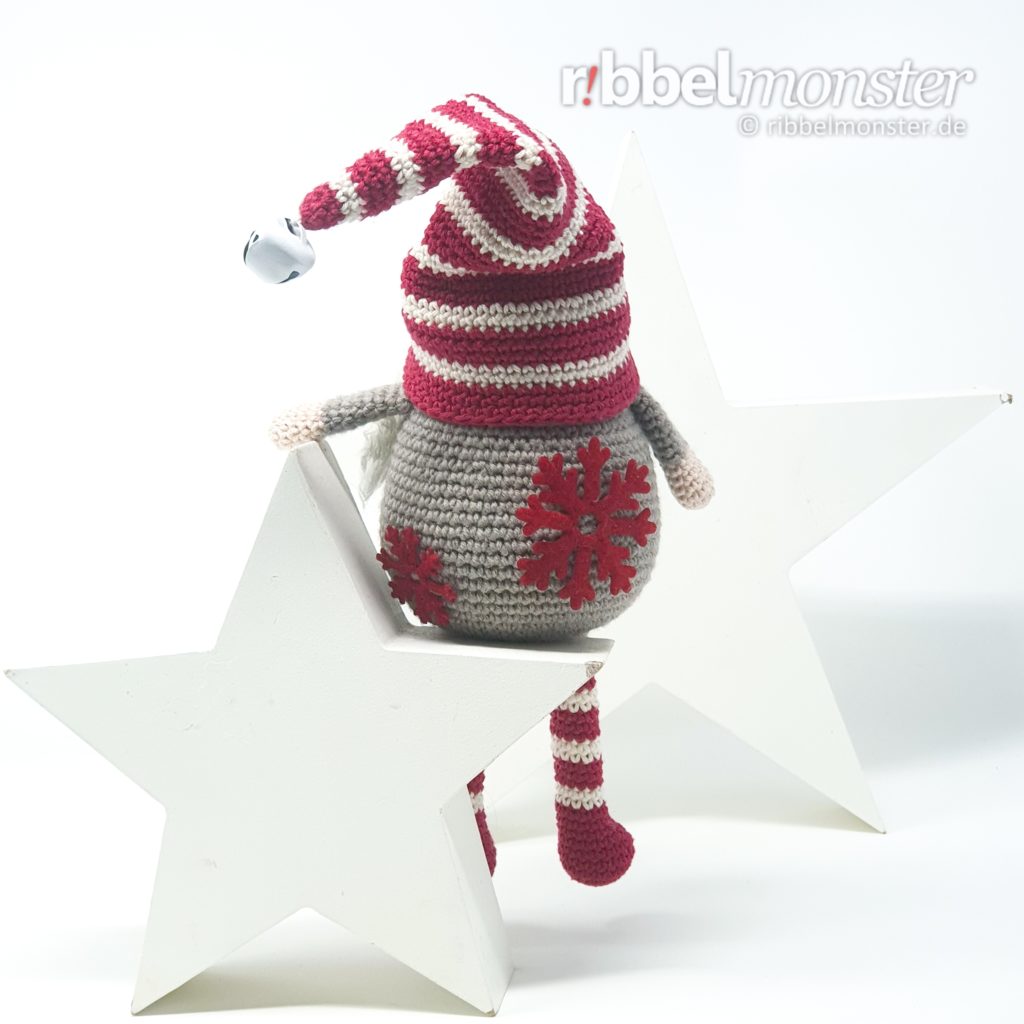
Attention! Amigurumis are very cute and, therefore, not only popular among adults. Children often see them as toys, so you should be especially careful. Amigurumis that are not intended for play should be kept out of the reach of children. If an Amigurumi is meant to be played with by children, you should strictly adhere to the guidelines for toys. If you plan to give away or sell Amigurumis (license for sellers), you must strictly adhere to the legal requirements for toys and display the required CE marking.
Prerequisites
To effortlessly execute this crochet pattern for the Amigurumi Christmas Gnome, you should already be familiar with the following crochet techniques. If you do not master all of them yet, you will find comprehensive tutorials here to learn them.
- Decreases
- Double Crochet Stitches (UK!)
- Increases
- Loops of a Stitch
- Magic Ring
- Slip Stitches
- Spiral Rounds
Note! By offsetting regular increases and decreases, they become almost invisible. You can recognize regular increases by the phrase “double every … stitch,” and regular decreases by the phrase “crochet together every … and … stitch”. The stitch chart for spheres and circles might also be helpful for you.
Note! Using a special technique for invisible decreases makes them nearly invisible. Although this technique requires a bit of practice, it’s worth giving it a try.
Supplies
The Amigurumi Christmas Gnome was made with the materials listed below. You can also crochet the Amigurumi Christmas Gnome with a different yarn and a matching crochet hook size. If you want to achieve an authentic result, you should use these materials as accurately as possible. In the following list, you will find, in addition to the materials, all the necessary tools and supplies.
Bell – any – 15mm
I used a bell in a matching shade with a 3/5 inch diameter. If you don’t have jingle bells on hand, I’ve found a replacement for you.
Crochet Hook
You will need a crochet hook with a size of 12 (british). For converting to other sizes, the crochet hook size converter will help you. I have selected some great crochet hooks for you here.
Darning Yarn
I have used darning yarn in the shade of black here. If you cannot find a suitable darning yarn in your supplies, I have already selected some for you.
Filling
For filling, I used plastic granules with a diameter of about 1/6 inches. However, there are numerous alternatives for filling material. If you’ve run out of filling, I’ve prepared a refill for you here.
Filling
For filling, I used synthetic filling made of 100% polyester. However, there are numerous alternatives for filling material. If you’ve run out of filling, I’ve prepared a refill for you here.
Ornament – Felt – Snowflake – Red
I used a red felt snowflakes as ornaments. If you don’t have ornaments available, I’ve found a replacement for you.
Paint
I used acrylic paint in the shade of red here. This paint is non-toxic, water-dilutable, waterproof, and adheres to almost any surface. I found a great set of acrylic paints for you to try out here.
Pins
You’ll also need a few pins. The more colorful your collection, the better. If you need more, I’ve found something for you.
Scissors – any
You’ll need any scissors. It’s best to use your most beautiful scissors because it brings you joy. If you don’t have really nice scissors, I’ve picked out some lovely ones for you.
Wool Needle
You’ll need a wool needle with a blunt tip. The thickness of the wool needle should match the thickness of your yarn. You might like the set of wool needles I’ve picked out for you.
Yarn – Schachenmayr – Catania – 106 – weiß
I used yarn in the shade White. The material is 100% cotton. The yardage is 137 yds / 1.75 oz. If you want to replenish your supply, I’ve already picked out the matching yarn for you here.
Yarn – Schachenmayr – Catania – 257 – bast (beige)
I used yarn in the shade Bast. The material is 100% cotton. The yardage is 137 yds / 1.75 oz. If you want to replenish your supply, I’ve already picked out the matching yarn for you here.
Yarn – Schachenmayr – Catania – 263 – softaprikot (hautfarbe)
I used yarn in the shade Soft Apricot. The material is 100% cotton. The yardage is 137 yds / 1.75 oz. If you want to replenish your supply, I’ve already picked out the matching yarn for you here.
Yarn – Schachenmayr – Catania – 425 – burgund (burgunderrot)
I used yarn in the shade Burgundy. The material is 100% cotton. The yardage is 137 yds / 1.75 oz. If you want to replenish your supply, I’ve already picked out the matching yarn for you here.
Yarn – Schachenmayr – Merino Extrafine 120
I used yarn in the shade Grey-Brown. The material is 100% wool. The yardage is 131 yds / 1.75 oz. If you want to replenish your supply, I’ve already picked out the matching yarn for you here.
Note! In this pattern, a shade referred to as “skin colour” is used. I chose the shade based on my personal preference. However: The world is diverse! There are many other possible skin colours you can use. Feel free to adjust the yarn selection to your personal taste!
Note! The specified yarn was used for the example shown here. In principle, you can use any yarn and an appropriate needle size. However, the quality of the material also affects the quality of the result, so you should avoid cutting corners in the wrong place. Also, the thickness of the yarn and the needle will influence the size of the outcome, which you can, of course, intentionally take advantage of.
Size
Here are the size specifications for the crocheted Christmas gnome. The height was measured standing without the hat. Please note that the actual size depends on the yarn used, the size of the crochet hook, and individual crochet tension.
| Needle Size | Yardage | Size |
|---|---|---|
| Crochet Hook 12 | 137 yds / 1.75 oz | 4 2/5 inch |
| Crochet Hook 11 | 120 yds / 1.75 oz | ? |
| Crochet Hook 9 or 10 | 93 yds / 1.75 oz | ? |
Note! If you want to change the size, you can simply use a thicker or thinner yarn with a suitable needle size. Simply doubling the rounds, rows, and stitches, on the other hand, will only result in an uneven outcome.
Crochet Pattern: Amigurumi – Crochet Christmas Gnome “Terentius Tenuis”
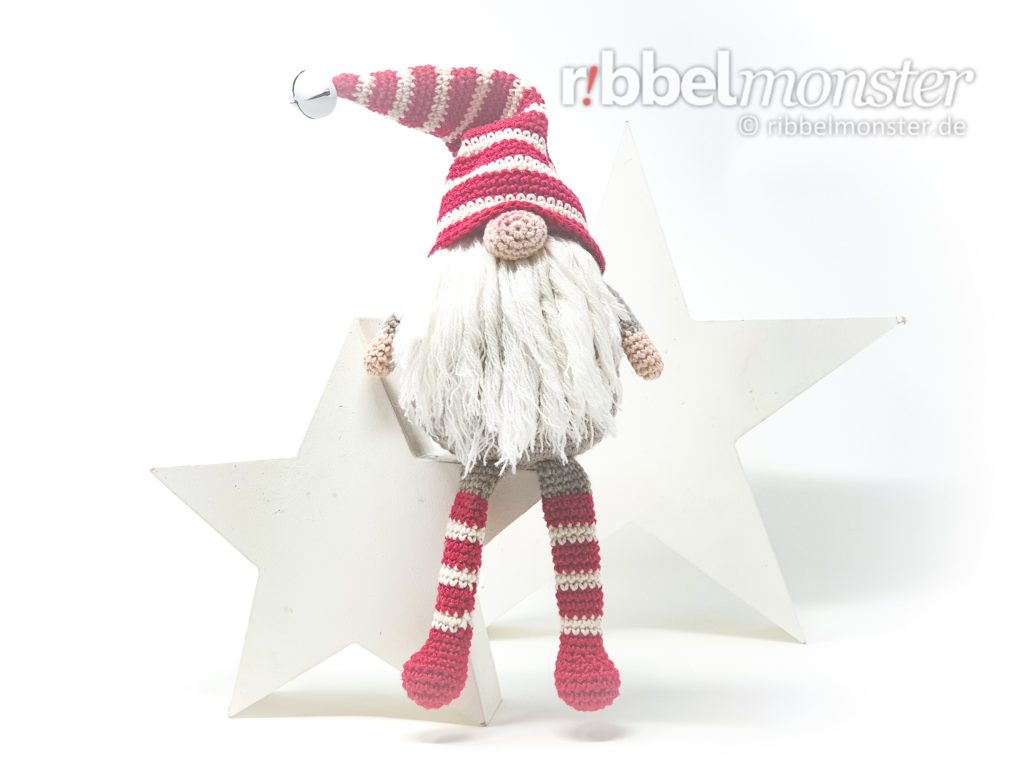
For the Amigurumi Crochet Christmas Gnome, we first crochet the body and head in one piece and then a bulbous nose, long arms, long legs, and finally the striped pointy hat. After that, all parts are sewn together, and the beard and hair are attached, along with embroidered eyes and ornaments, including a jingle bell.
Crochet Body (1x)
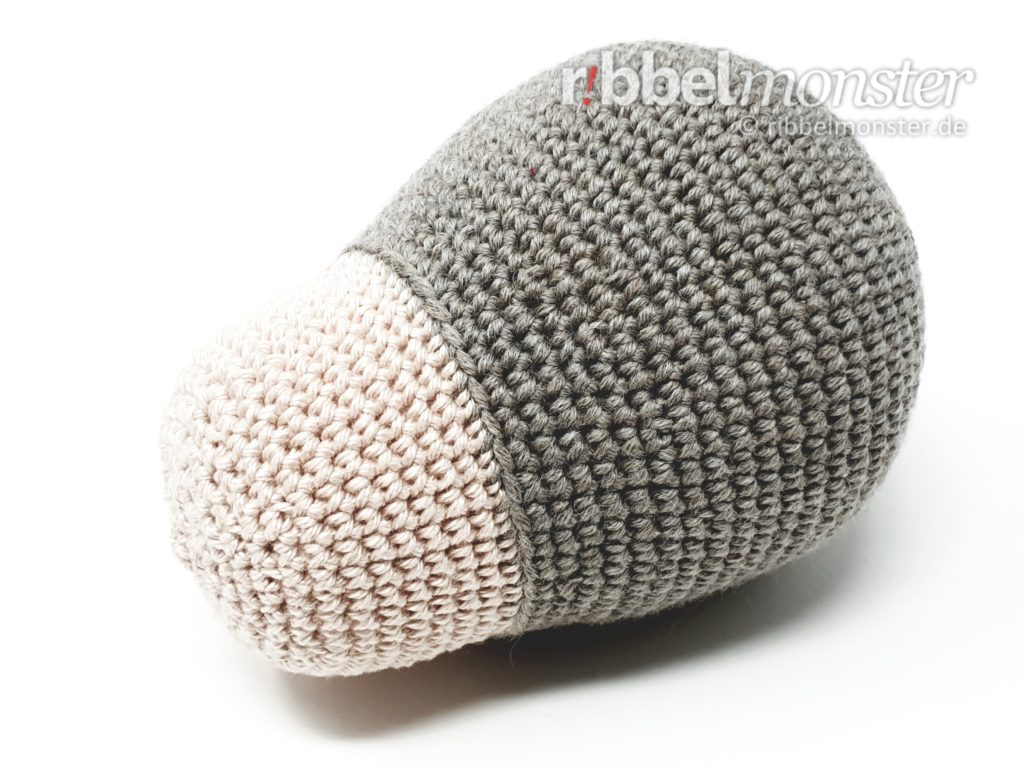
The body for the Crochet Christmas Gnome is worked from bottom to top in spiral rounds using only double crochet stitches (UK!). Once you finish the body, continue crocheting the head.
Note! Your Amigurumi may have difficulty sitting independently if it is filled entirely with a uniformly light stuffing. To improve this, you can incorporate an appropriate center of gravity. Simply fill the bottom of the body with some plastic granules to add a little weight to the body. This way, your Amigurumi can sit much more easily on its own.
Note! If you want to achieve a particularly beautiful result, you can hide regular increases and decreases by offsetting them a little. You can recognize regular increases by the phrase “double every … stitch,” and regular decreases by the phrase “crochet together every … and … stitch”. The stitch chart for spheres and circles might also be helpful for you. Additionally, you can apply a special crochet technique here for invisible decreases.
- grey:
- 1st round:
- magic ring
- into the magic ring:
- 6 double crochet stitches (UK!)
- = 6 stitches
- 2nd round:
- double every stitch
- = 12 stitches
- 3rd round:
- double every 2nd stitch
- = 18 stitches
- 4th round:
- double every 3rd stitch
- = 24 stitches
- 5th round:
- double every 4th stitch
- = 30 stitches
- 6th round:
- double every 5th stitch
- = 36 stitches
- 7th round:
- double every 6th stitch
- = 42 stitches
- 8th round:
- double every 7th stitch
- = 48 stitches
- 9th round:
- double every 8th stitch
- = 54 stitches
- 10th round:
- double every 9th stitch
- = 60 stitches
- 11th – 21st round:
- (= 11 rounds)
- every stitch one stitch
- = 60 stitches
- 22nd round:
- crochet together every 19th and 20th stitch
- = 57 stitches
- 23rd round:
- crochet together every 18th and 19th stitch
- = 54 stitches
- 24th round:
- crochet together every 17th and 18th stitch
- = 51 stitches
- 25th round:
- crochet together every 16th and 17th stitch
- = 48 stitches
- 26th round:
- crochet together every 15th and 16th stitch
- = 45 stitches
- 27th round:
- crochet together every 14th and 15th stitch
- = 42 stitches
- 28th round:
- every stitch one stitch
- = 42 stitches
- do NOT cut yarn, continue with:
- Head
Crochet Head (1x)
The head for the Crochet Christmas Gnome is worked directly onto the body, also from bottom to top in spiral rounds using only double crochet stitches (UK!).
Note! If you want to achieve a particularly beautiful result, you can hide regular decreases by offsetting them a little. You can recognize regular decreases by the phrase “crochet together every … and … stitch”. The stitch chart for spheres and circles might also be helpful for you. Additionally, you can apply a special crochet technique here for invisible decreases.
- skin-colored:
- 29th round:
- into the back loop only:
- every stitch one stitch
- = 42 stitches
- into the back loop only:
- 30th – 36th round:
- (= 7 rounds)
- every stitch one stitch
- = 42 stitches
- 37th round:
- crochet together every 6th and 7th stitch
- = 36 stitches
- 38th round:
- crochet together every 5th and 6th stitch
- = 30 stitches
- 39th round:
- crochet together every 4th and 5th stitch
- = 24 stitches
- fill and stuff completely
- 40th round:
- crochet together every 3rd and 4th stitch
- = 18 stitches
- 41st round:
- crochet together every 2nd and 3rd stitch
- = 12 stitches
- 42nd round:
- crochet together every 1st and 2nd stitch
- = 6 stitches
- cut yarn generously, pull through loop, close the remaining opening, secure and weave in the yarn end
Crochet Nose (1x)
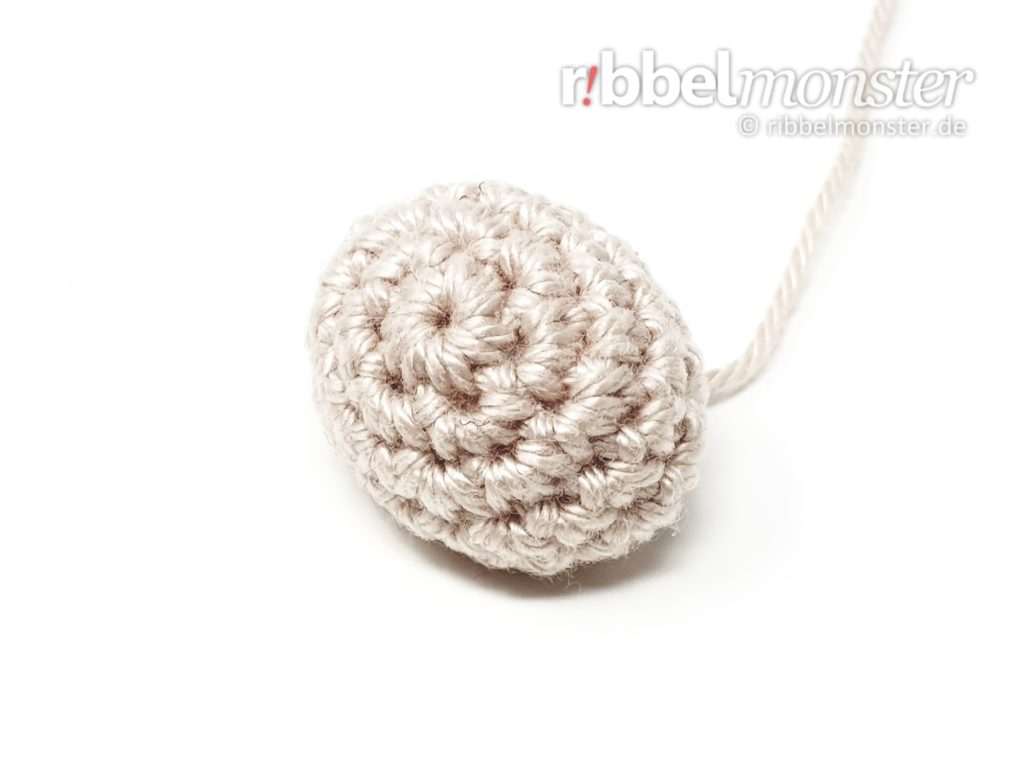
The nose for the Crochet Christmas Gnome is worked from tip to base in spiral rounds using only double crochet stitches (UK!).
Note! If you want to achieve a particularly beautiful result, you can hide regular increases and decreases by offsetting them a little. You can recognize regular increases by the phrase “double every … stitch,” and regular decreases by the phrase “crochet together every … and … stitch”. The stitch chart for spheres and circles might also be helpful for you. Additionally, you can apply a special crochet technique here for invisible decreases.
- skin-colored:
- 1st round:
- magic ring
- into the magic ring:
- 6 double crochet stitches (UK!)
- = 6 stitches
- 2nd round:
- double every stitch
- = 12 stitches
- 3rd round:
- 3x two double crochet stitches (UK!) into one stitch
- 3x one double crochet stitch (UK!) into one stitch
- 3x two double crochet stitches (UK!) into one stitch
- 3x one double crochet stitch (UK!) into one stitch
- = 18 stitches
- 4th + 5th round:
- (= 2 rounds)
- every stitch one stitch
- = 18 stitches
- 6th round:
- 2x one double crochet stitch (UK!) into one stitch
- 3x crochet together two stitches with one double crochet stitch (UK!)
- 3x one double crochet stitch (UK!) into one stitch
- 3x crochet together two stitches with one double crochet stitch (UK!)
- 1x one double crochet stitch (UK!) into one stitch
- = 12 stitches
- fill and stuff completely
- 7th round:
- crochet together every 1st and 2nd stitch
- = 12 stitches
- Cut off thread generously, pull a loop, close the remaining opening, DO NOT secure and darn in the end, will be used later for sewing
Crochet Arms (2x)
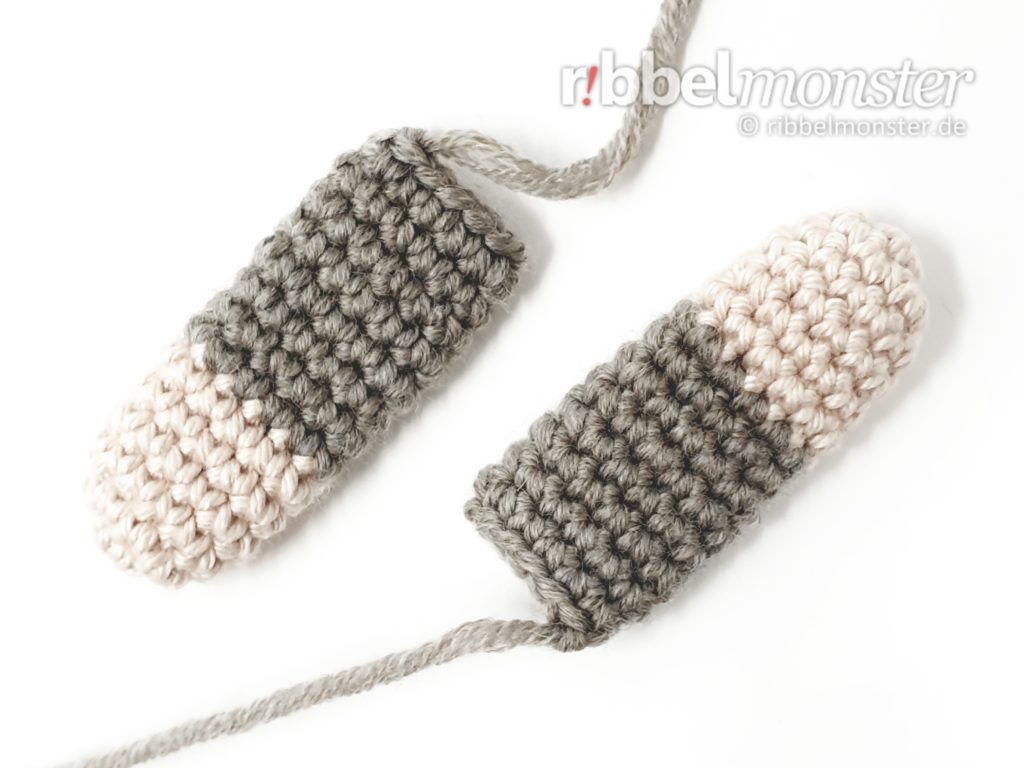
The arms for the Crochet Christmas Gnome are worked from fingertips to shoulders in spiral rounds using only double crochet stitches (UK!). The arms are not stuffed but only flat folded.
Tip: Wenn du ein besonders schönes Ergebnis erhalten möchtest, kannst du die regelmäßigen Zunahmen durch Versetzen ein wenig verstecken. Dazu verwendest du einfach die Maschentabelle für Kugeln und Kreise.
(Redaktion: Block ersetzen)
Note! If you want to create several nearly identical parts, it’s advisable to work on them consecutively on the same day. For larger parts, it’s even recommended to work on them simultaneously in stages. Our tension and tightness can vary from day to day, leading to visible differences.
- skin-colored:
- 1st round:
- magic ring
- into the magic ring:
- 6 double crochet stitches (UK!)
- = 6 stitches
- 2nd round:
- double every stitch
- = 12 stitches
- 3rd – 6th round:
- (= 4 rounds)
- every stitch one stitch
- = 12 stitches
- grey:
- 7th – 13th round:
- (= 7 rounds)
- every stitch one stitch
- = 12 stitches
- 14th round:
- every stitch one stitch
- = 12 stitches
- beyond the end of the round:
- 1x one slip stitch into one stitch
- cut yarn generously, pull through loop, do NOT cut the yarn end, it will be used later for sewing
Crochet Legs (2x)
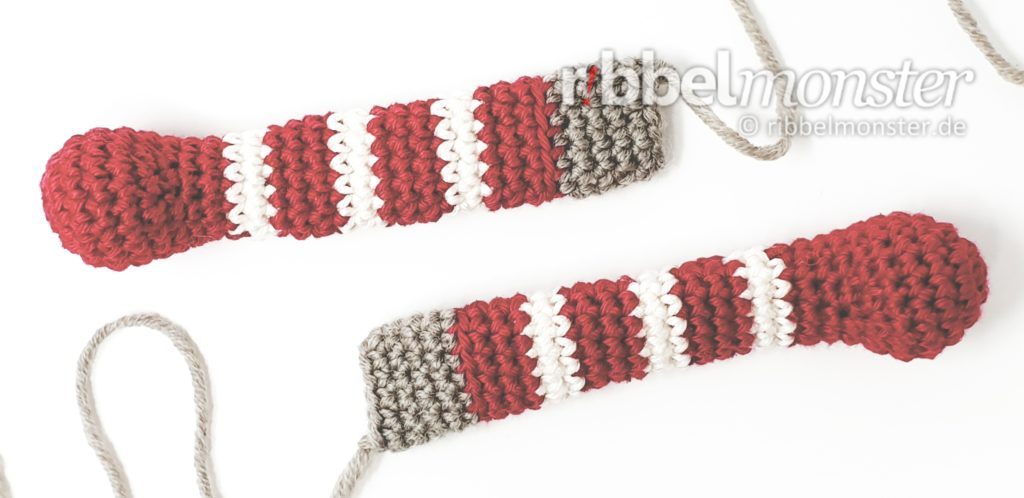
The legs for the Crochet Christmas Gnome are worked from toe to base in spiral rounds using only double crochet stitches (UK!).
Note! If you want to create several nearly identical parts, it’s advisable to work on them consecutively on the same day. For larger parts, it’s even recommended to work on them simultaneously in stages. Our tension and tightness can vary from day to day, leading to visible differences.
Note! If you want to achieve a particularly beautiful result, you can hide regular increases and decreases by offsetting them a little. You can recognize regular increases by the phrase “double every … stitch,” and regular decreases by the phrase “crochet together every … and … stitch”. The stitch chart for spheres and circles might also be helpful for you. Additionally, you can apply a special crochet technique here for invisible decreases.
- red:
- 1st round:
- magic ring
- into the magic ring:
- 6 double crochet stitches (UK!)
- = 6 stitches
- 2nd round:
- double every stitch
- = 12 stitches
- 3rd round:
- 3x two double crochet stitches (UK!) into one stitch
- 3x one double crochet stitch (UK!) into one stitch
- 3x two double crochet stitches (UK!) into one stitch
- 3x one double crochet stitch (UK!) into one stitch
- = 18 stitches
- 4th – 6th round:
- (= 3 rounds)
- every stitch one stitch
- = 18 stitches
- 7th round:
- 2x one double crochet stitch (UK!) into one stitch
- 3x crochet together two stitches with one double crochet stitch (UK!)
- 10x one double crochet stitch (UK!) into one stitch
- = 15 stitches
- 8th round:
- 1x one double crochet stitch (UK!) into one stitch
- 3x crochet together two stitches with one double crochet stitch (UK!)
- 8x one double crochet stitch (UK!) into one stitch
- = 12 stitches
- fill and stuff completely
- 9th + 10th round:
- (= 2 rounds)
- every stitch one stitch
- = 12 stitches
- beige:
- 11th + 12th round:
- (= 2 rounds)
- every stitch one stitch
- = 12 stitches
- red:
- 13th – 15th round:
- (= 3 rounds)
- every stitch one stitch
- = 12 stitches
- beige:
- 16th + 17th round:
- (= 2 rounds)
- every stitch one stitch
- = 12 stitches
- red:
- 18th – 20th round:
- (= 3 rounds)
- every stitch one stitch
- = 12 stitches
- beige:
- 21st + 22nd round:
- (= 2 rounds)
- every stitch one stitch
- = 12 stitches
- red:
- 23rd – 25th round:
- (= 3 rounds)
- every stitch one stitch
- = 12 stitches
- grey:
- 26th round:
- into the back loop only:
- every stitch one stitch
- = 12 stitches
- into the back loop only:
- 27th – 30th round:
- (= 4 rounds)
- every stitch one stitch
- = 12 stitches
- cut yarn generously, pull through loop, do NOT cut the yarn end, it will be used later for sewing
Crochet Pointy Hat (1x)
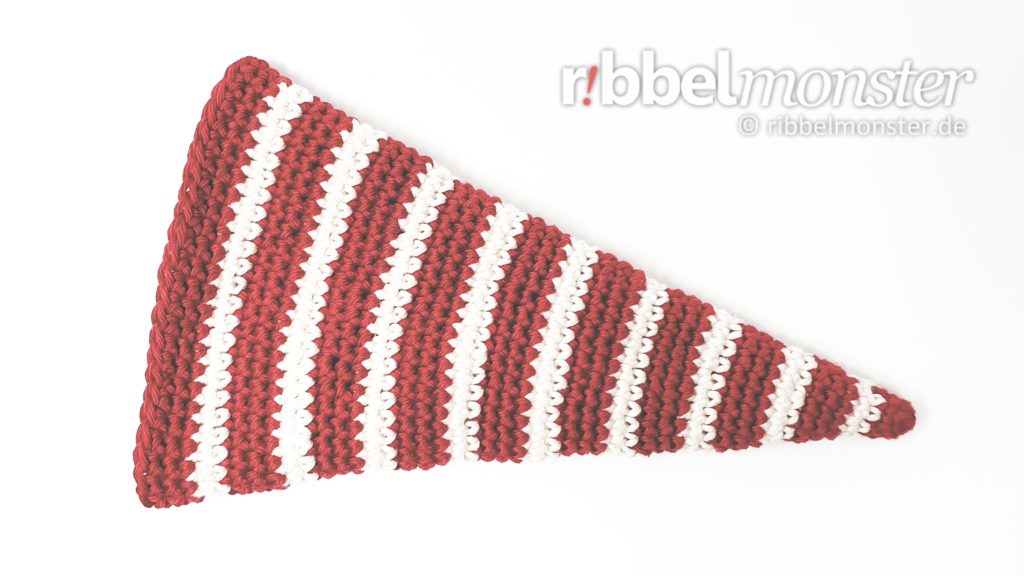
The pointy hat for the Crochet Christmas Gnome is worked from tip to brim in spiral rounds using only double crochet stitches (UK!).
Tip: Wenn du ein besonders schönes Ergebnis erhalten möchtest, kannst du die regelmäßigen Zunahmen durch Versetzen ein wenig verstecken. Dazu verwendest du einfach die Maschentabelle für Kugeln und Kreise.
(Redaktion: Block ersetzen)
- red:
- 1st round:
- magic ring
- into the magic ring:
- 6 double crochet stitches (UK!)
- = 6 stitches
- 2nd round:
- double every 6th stitch
- = 7 stitches
- 3rd round:
- double every 7th stitch
- = 8 stitches
- beige:
- 4th round:
- double every 8th stitch
- = 9 stitches
- 5th round:
- double every 9th stitch
- = 10 stitches
- red:
- 6th round:
- double every 10th stitch
- = 11 stitches
- 7th round:
- double every 11th stitch
- = 12 stitches
- 8th round:
- double every 12th stitch
- = 13 stitches
- beige:
- 9th round:
- double every 13th stitch
- = 14 stitches
- 10th round:
- double every 14th stitch
- = 15 stitches
- red:
- 11th round:
- double every 15th stitch
- = 16 stitches
- 12th round:
- double every 16th stitch
- = 17 stitches
- 13th round:
- double every 17th stitch
- = 18 stitches
- beige:
- 14th round:
- double every 18th stitch
- = 19 stitches
- 15th round:
- double every 19th stitch
- = 20 stitches
- red:
- 16th round:
- double every 20th stitch
- = 21 stitches
- 17th round:
- double every 21st stitch
- = 22 stitches
- 18th round:
- double every 22nd stitch
- = 23 stitches
- beige:
- 19th round:
- double every 23rd stitch
- = 24 stitches
- 20th round:
- double every 24th stitch
- = 25 stitches
- red:
- 21st round:
- double every 25th stitch
- = 26 stitches
- 22nd round:
- double every 26th stitch
- = 27 stitches
- 23rd round:
- double every 27th stitch
- = 28 stitches
- beige:
- 24th round:
- double every 28th stitch
- = 29 stitches
- 25th round:
- double every 29th stitch
- = 30 stitches
- red:
- 26th round:
- double every 30th stitch
- = 31 stitches
- 27th round:
- double every 31st stitch
- = 32 stitches
- 28th round:
- double every 32nd stitch
- = 33 stitches
- beige:
- 29th round:
- double every 33rd stitch
- = 34 stitches
- 30th round:
- double every 34th stitch
- = 35 stitches
- red:
- 31st round:
- double every 35th stitch
- = 36 stitches
- 32nd round:
- double every 36th stitch
- = 37 stitches
- 33rd round:
- double every 37th stitch
- = 38 stitches
- beige:
- 34th round:
- double every 38th stitch
- = 39 stitches
- 35th round:
- double every 39th stitch
- = 40 stitches
- red:
- 36th round:
- double every 40th stitch
- = 41 stitches
- 37th round:
- double every 41st stitch
- = 42 stitches
- 38th round:
- double every 42nd stitch
- = 43 stitches
- beige:
- 39th round:
- double every 43rd stitch
- = 44 stitches
- 40th round:
- double every 44th stitch
- = 45 stitches
- red:
- 41st round:
- double every 45th stitch
- = 46 stitches
- 42nd round:
- double every 46th stitch
- = 47 stitches
- 43rd round:
- double every 47th stitch
- = 48 stitches
- beige:
- 44th + 45th round:
- (= 2 rounds)
- every stitch one stitch
- = 48 stitches
- red:
- 46th + 47th round:
- (= 2 rounds)
- every stitch one stitch
- = 48 stitches
- 48th round:
- every stitch one stitch
- = 48 stitches
- beyond the end of the round:
- 1x one slip stitch into one stitch
- cut yarn, pull through loop, secure and weave in the yarn end
Finish Christmas Gnome
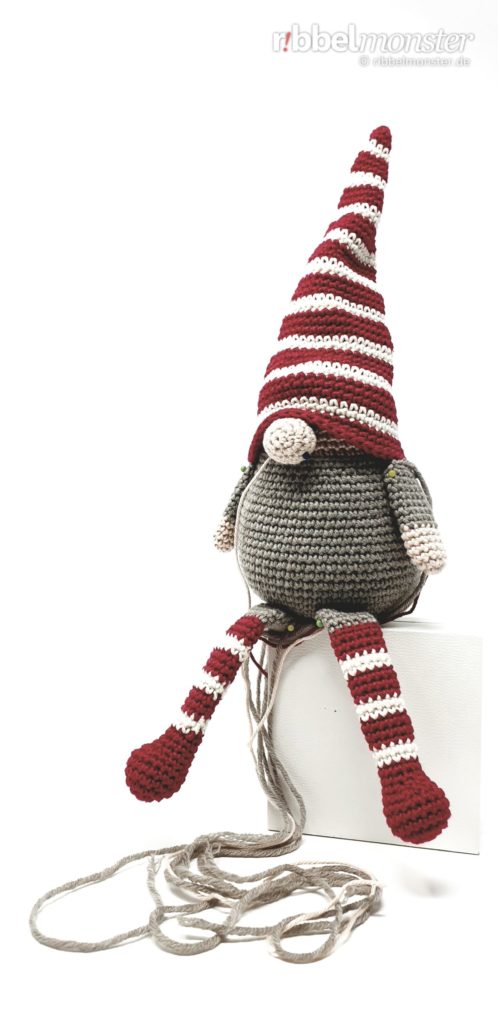
Next, you can put all the pieces together with pins to see how they have to fit. Do not start sewing until everything is in place and you are satisfied with the result.
Sew Nose onto Head

We start with the nose because it serves as our reference point for the center. It sits in the middle of the face and is sewn around between the second and fourth round above the collar. You can use the thread end for this, but make sure that the round transition from the collar on the body is on the back. Finally, secure and stitch the thread end inside the body.
Sew Arms to Body
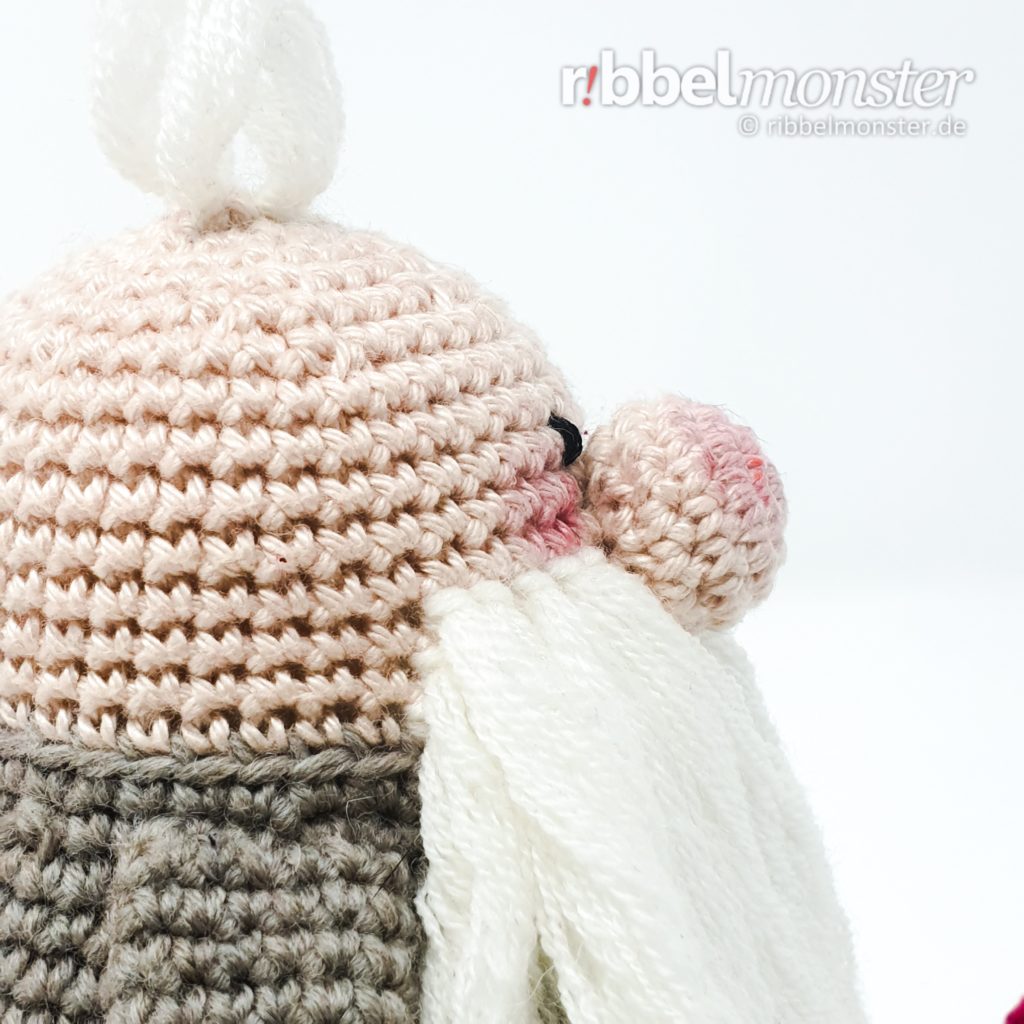
The arms are sewn flat folded one round below the collar, with the round transition on the inside. First, mark the two middle stitches of the round below the nose. Then, sew the arms with the thread ends about 16 stitches apart. These threads are also secured and stitched inside at the end.
Sew Legs to Body

Next, mark a middle stitch at the lower end of the body to find the center between the legs. Then, lay your gnome on its back and sew the legs flat folded with the opening around the 6th round, leaving about 3 stitches apart between them.

Now your gnome is already sewn together.
Attach Beard

Now you can attach the beard, and you might find the pattern for attaching hair helpful. Use threads that are 2 times as long as the body. Start in the round directly above the collar and work around all stitches from arm to arm. Work the two rounds above in the same way, inevitably omitting the nose. Now attach the beard with scissors, if necessary. First, cut it to the correct length if necessary. Then, gently taper it from the sides to the center until the shape is right.
Attach Hair

Afterward, you can also crochet the hair wreath. Use threads that are just long enough to knot. It starts at the level of the sideburns and extends down over 3 rounds. Make sure to work from the outsides to the center at the back of the head because there is a small offset at the center of the back of the head since the spiral rounds do not meet precisely. Then, cut all the hair from the hair wreath up to the height of the arm attachment and be careful not to shorten the sideburns.
Embroider Eyes

Now it’s time to embroider the eyes with black yarn above the nose. It’s important that the eyes are above the nose so they are not visible with the hat on. Simply stitch vertically around two stitches until the eye is the right size, and finally, secure the thread ends inside.
Sew Ornaments

Use thin sewing thread in a matching color to sew ornaments, such as snowflakes, onto the back of the gnome. Secure the thread ends inside the body.
Attach Bell

Next, sew the white bell to the tip of the pointy hat using white crochet thread.
Paint Nose and Cheeks
If you’d like, you can paint a red nose and red cheeks on your gnome. Perhaps this tutorial for gentle cheeks will help you.
Done!

With that, your Amigurumi Christmas Gnome is already complete. Now you can put the hat on your gnome and enjoy the amusing sight. It will surely bring a smile to the faces of all curious onlookers when they take off its hat.

Have you caught the gnome fever now? – Not a problem. I have a few more fantastic crochet patterns for adorable gnomes. Take a look here!
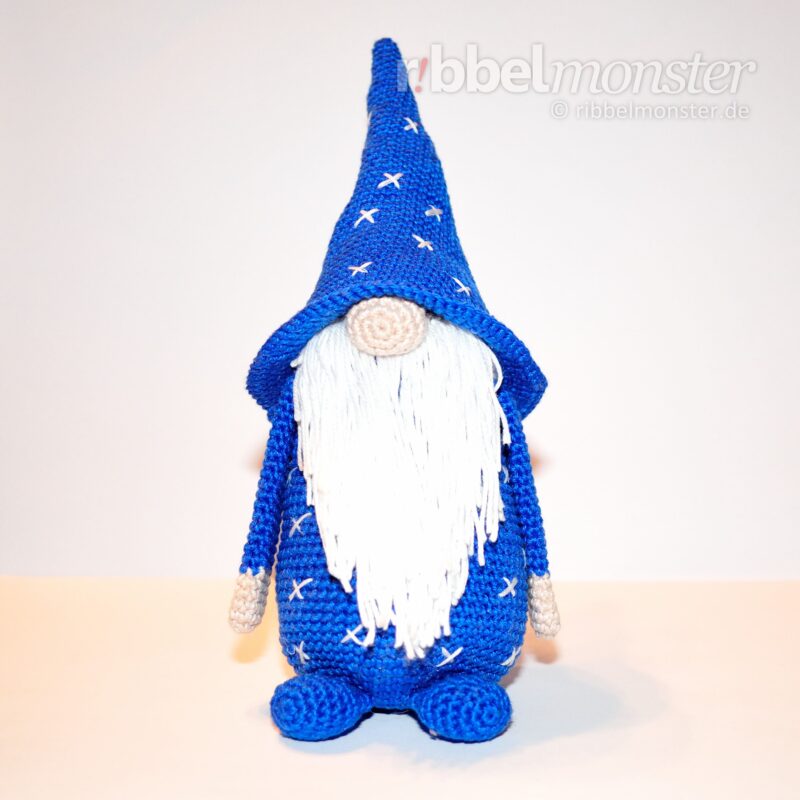
If your home is lacking a bit of magic, you can easily crochet a Crochet Wizard Gnome. Magnus Magicus will surely bring a great smile to your curious guests’ faces.
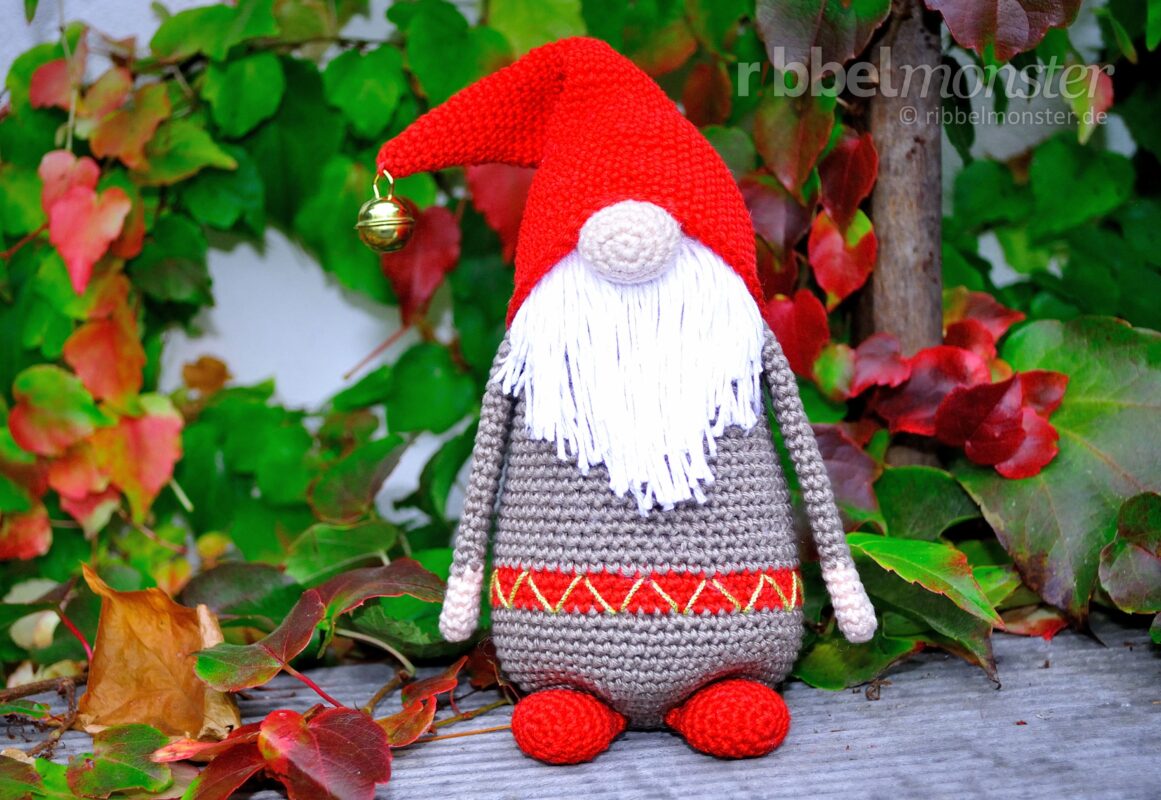
In time for the Christmas season, you can also crochet a Christmas Gnome. Samtan Salaputius will undoubtedly bring joy not only to the eyes of children.
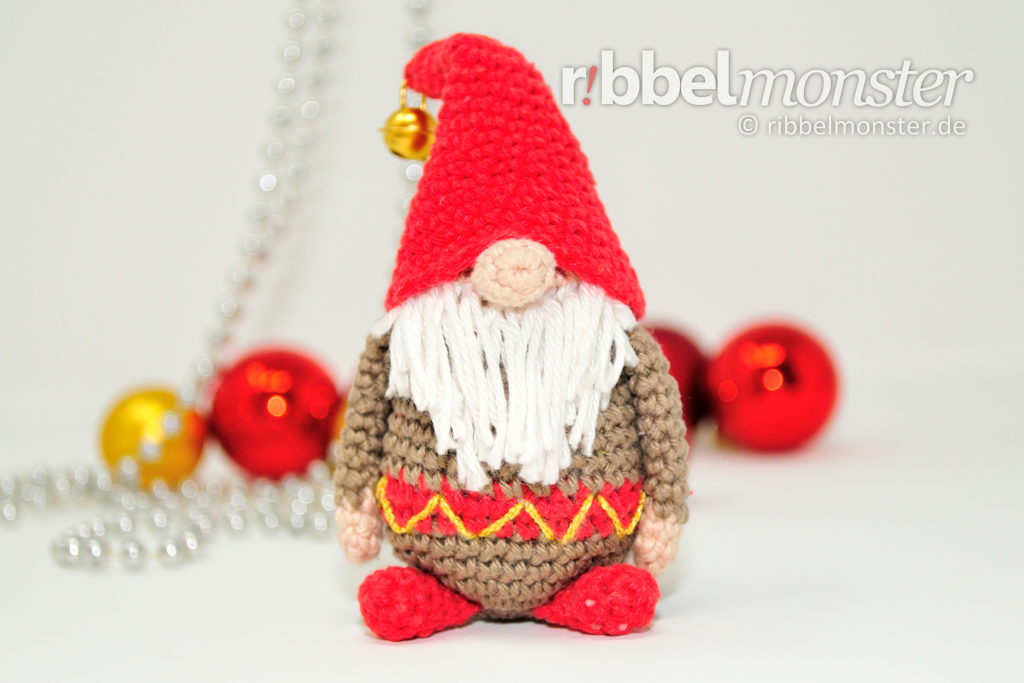
By the way, our Christmas gnome also has a mini version. So, you can crochet a Mini Christmas Gnome and take it everywhere you need a bit of Christmas spirit.

And because you can never have enough Christmas gnomes in the house, here’s another crochet pattern for a Christmas Gnome.
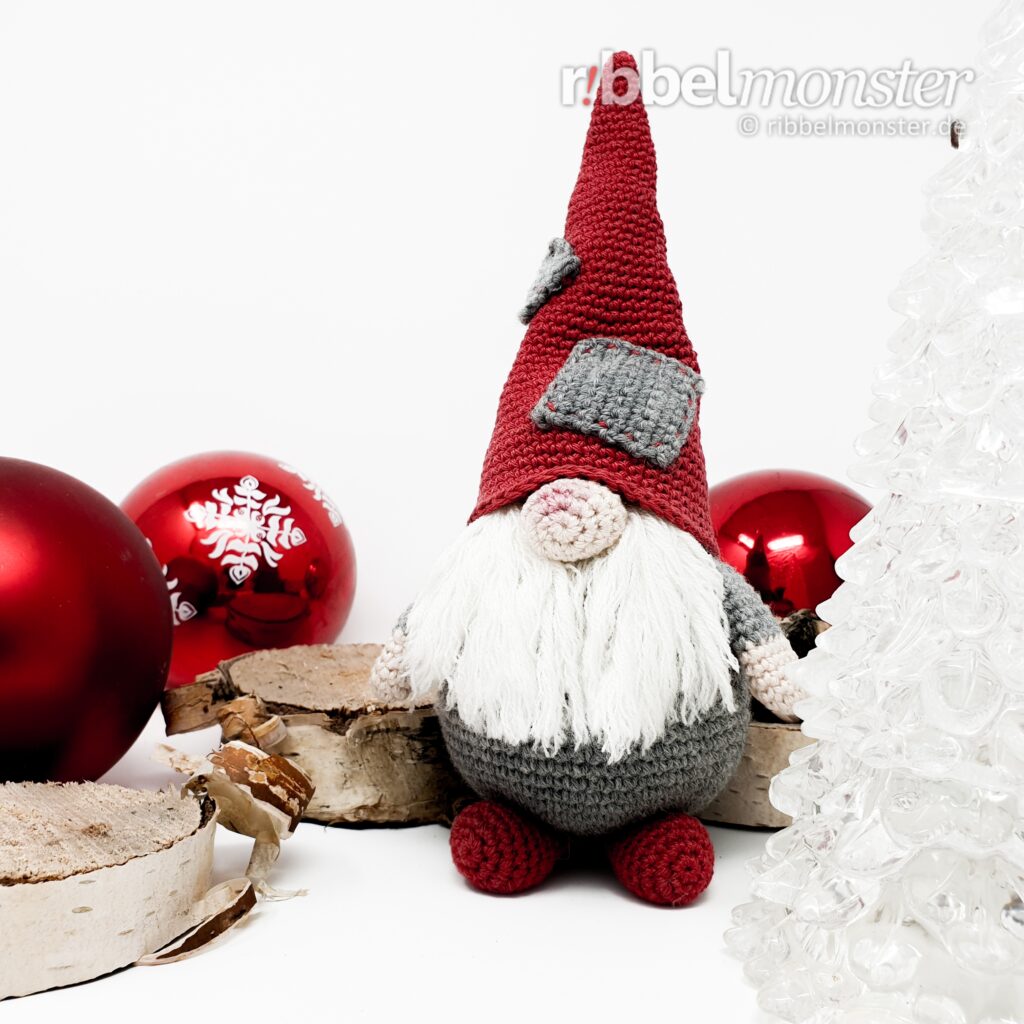
If you’d like a gnome for the whole year, perhaps the crochet pattern for the Amigurumi Patchwork Gnome is just right for you.

